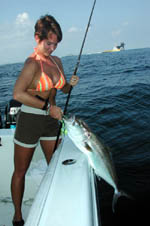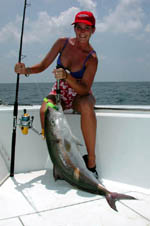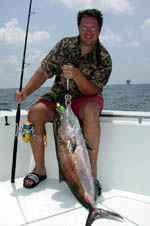
|
Features
|
|
|
|
Books
|
|
|
|
Fun & Games
|
|
|
|
Contact Us
|
|
|
John's Journal... Entry 217, Day 5
FISHING AT ORANGE BEACH - THE SALT-WATER FISHING CAPITAL
Bet On The Jacks And Other Salt-Water Fish
 Editor's
Note: You'll find October the best time to go salt-water fishing with
children in school, and most people thinking about football and hunting
season starting, the beaches generally become deserted. Each fall in October,
Gulf Shores and Orange Beach on Alabama's Gulf Coast host the annual Shrimp
Festival, featuring food, fun and fishing for me and my family as well
as the opportunity to hear bands playing all types of music and to view
artwork, sculptures and crafts for free.
Editor's
Note: You'll find October the best time to go salt-water fishing with
children in school, and most people thinking about football and hunting
season starting, the beaches generally become deserted. Each fall in October,
Gulf Shores and Orange Beach on Alabama's Gulf Coast host the annual Shrimp
Festival, featuring food, fun and fishing for me and my family as well
as the opportunity to hear bands playing all types of music and to view
artwork, sculptures and crafts for free.
Salt-water fish have become such a premium that fish once considered trash fish are now viewed as a delicacy. I don't really know how fish get branded a trash fish. Most fish that swim in the Gulf are good to eat. I agree that some fish taste better than others, but basically they are all good to eat.
For many years the amberjack was considered a trash fish. I can remember giving away amberjack at the dock to poor folks who didn't have anything to eat. But today, the amberjack has gone from a trash fish to one of the most-sought-after fish in the Gulf. The amberjack's meat is firm and delicious, and it's an extremely-hard fighting fish. Most anglers who catch one or two amberjack have had about all the rod-bending action they want. If you catch one over 20 pounds, more than likely, you'll have to stop and rest before you fish again. Amberjack stay high in the water like the king mackerel. So, you can catch amberjack while you fish for red snapper, if you fish with live bait, and only let your bait about half-way down to the bottom.
 One
of the most fun ways to catch amberjack is to jig for them. The amberjack
likes to chase a bait. So when you fish for jacks, try using heavy-spinning
tackle and a large jig. Cast the jig out, and let it fall to the bottom.
Many times the jack will take the jig as it falls. However, if the jig
gets all the way to the bottom without getting bit, jerk it hard up off
the bottom, reel up the slack, jerk it again and reel up the slack. The
faster you can get the jig back to the boat, the more likely you are to
have a jack attack. When an amberjack hits a jig on light tackle, you
won't have to worry about setting the hook because the vicious jack will
set it for you. Remember to expect a hard, strong fight when you fish
for jacks. The amberjack is an extremely-powerful fish. It swims in the
open water all day and all night, and it doesn't like to ride in charter
boats. So, when you have a jack attack, plan to work with the fish.
One
of the most fun ways to catch amberjack is to jig for them. The amberjack
likes to chase a bait. So when you fish for jacks, try using heavy-spinning
tackle and a large jig. Cast the jig out, and let it fall to the bottom.
Many times the jack will take the jig as it falls. However, if the jig
gets all the way to the bottom without getting bit, jerk it hard up off
the bottom, reel up the slack, jerk it again and reel up the slack. The
faster you can get the jig back to the boat, the more likely you are to
have a jack attack. When an amberjack hits a jig on light tackle, you
won't have to worry about setting the hook because the vicious jack will
set it for you. Remember to expect a hard, strong fight when you fish
for jacks. The amberjack is an extremely-powerful fish. It swims in the
open water all day and all night, and it doesn't like to ride in charter
boats. So, when you have a jack attack, plan to work with the fish.
One of the most critical keys to catch a jack or just about any salt-water fish, is to remember that when the fish is taking off drag, don't wind the reel. Let the fish continue to take the line until it stops, and then begin to wind. Another important factor to remember when fishing for big fish is to try and keep your rod tip at the 11:00 position. The rod is designed to fight the fish. The higher you hold your rod, the more pressure the rod will put on the fish, and the easier the fish will be to fight. If you hold your rod lower to the water, you're more likely to be caught in a tug-of-war game, and the more difficult the fish will be to land. Don't try to land the jack quickly. Fight the amberjack until you wear it out and then bring the amberjacks laying on its side to the boat.
 The
same baits and the same position in the water that you fish for amberjacks
also will produce king mackerel, mangrove snapper and red snapper. As
fish come from the bottom to the surface, they tend to pull other fish
up off the bottom. Many times when you fish for amberjack, you'll catch
big snapper, cobia, and/or king mackerel. Plenty of amberjack live in
the Gulf, and they tend to hold on the bigger wrecks and reefs. Most charter-boat
captains know where to find them and how to catch them.
The
same baits and the same position in the water that you fish for amberjacks
also will produce king mackerel, mangrove snapper and red snapper. As
fish come from the bottom to the surface, they tend to pull other fish
up off the bottom. Many times when you fish for amberjack, you'll catch
big snapper, cobia, and/or king mackerel. Plenty of amberjack live in
the Gulf, and they tend to hold on the bigger wrecks and reefs. Most charter-boat
captains know where to find them and how to catch them.
If you plan to go deep-sea fishing during your next trip to the Gulf, I'd suggest that you book a 10-hour, a 12-hour, or an overnight trip, because you'll have more fishing time on the longer trips, and you can fish for more species of fish, catch more fish and you'll always have more fun. According to Stacy Tatum, a booking agent in Orange Beach, "on a 6-hour trip, six to eight fishermen generally will catch about 150 pounds of fish each. On an 8-hour trip, the fishermen will usually catch between 200- and 250-pounds each. On a 10-hour trip, they'll usually take about 300-pounds each.
 On
a 12-hour trip, they'll catch 400 pounds or more each. On an overnight
trip, they'll often catch well over 400-pounds each. These numbers aren't
guarantees; because we can't know the skill of the fishermen, weather
conditions or how hungry the fish are. But these are the average weights
brought to the docks after this many hours of fishing."
On
a 12-hour trip, they'll catch 400 pounds or more each. On an overnight
trip, they'll often catch well over 400-pounds each. These numbers aren't
guarantees; because we can't know the skill of the fishermen, weather
conditions or how hungry the fish are. But these are the average weights
brought to the docks after this many hours of fishing."
For more information on fishing in the Orange Beach/Gulf Shores area, call Stacey Tatum at (877) 783-3474, e-mail jmurphy@gulftel.com. or go to www.alabamadeepseafishing.com. Also, contact the Alabama Gulf Coast Convention and Visitor's Bureau at (800) 745-7263 or go to www.alabamatravel.orG or www.orangebeach.com.
Check back each day this week for more about FISHING AT ORANGE BEACH - THE SALT-WATER FISHING CAPITAL ...
Day 1 - Charter-Boat Fishing
At Orange Beach
Day 2 - October Salt-Water Fishing
Day 3 - Fishing On Orange Beach
Day 4 - Catch The Kings
Day 5 - Bet On The Jacks And Other Salt-Water
Fish